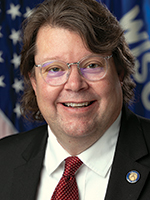 On Tuesday (January 9), the Senate Committee on Education, chaired by Sen. John Jagler (R-Watertown, pictured), is set to meet at 2:00 p.m. for a public hearing on three bills aimed at amending certain aspects of current school finance mechanisms. Two of the bills to be heard would change the funding source for the parental choice program and certain independent charter schools to come directly from state GPR funds, rather than these pupils being included in a district’s pupil count for the purposes of revenue limits and state aid and then funds being withdrawn from said school district and sent to a choice/charter school. The remaining bill to be heard by the committee would increase transfer payments made under the open enrollment program to $10,000.
On Tuesday (January 9), the Senate Committee on Education, chaired by Sen. John Jagler (R-Watertown, pictured), is set to meet at 2:00 p.m. for a public hearing on three bills aimed at amending certain aspects of current school finance mechanisms. Two of the bills to be heard would change the funding source for the parental choice program and certain independent charter schools to come directly from state GPR funds, rather than these pupils being included in a district’s pupil count for the purposes of revenue limits and state aid and then funds being withdrawn from said school district and sent to a choice/charter school. The remaining bill to be heard by the committee would increase transfer payments made under the open enrollment program to $10,000.
Read below for the full committee agenda.
Senate Bill 838 — Relating to: reductions to state aid paid to school districts for payments made under parental choice programs and the Special Needs Scholarship Program.
By Senator Jagler; cosponsored by Representative Schutt
This bill ends reductions to state aid paid to school districts for per pupil payments made under the Racine Parental Choice Program, the Wisconsin Parental Choice Program, and the Special Needs Scholarship Program beginning with payments made for pupils who begin in these programs in the 2024-25 school year.
Under the bill, current law applies to payments made under the RPCP, WPCP, and SNSP for pupils who began participating in these programs before July 1, 2024 (legacy pupils).
Senate Bill 652 — Relating to: reductions to state aid paid to school districts for payments to certain independent charter schools.
By Senator Jagler; cosponsored by Representative Schutt
Under current law, a pupil for whom a per pupil payment was made to an independent charter school authorized by a new charter school authorizer in the previous year is included in the pupil’s resident school district’s membership for purposes of calculating general state aids. Additionally, under current law, pupils attending an independent charter school authorized by a new charter school authorizer are included in their resident school district’s pupil count for purposes of calculating revenue limits. The bill repeals both of these provisions. Under the bill, a pupil attending an independent charter school authorized by a new charter school authorizer is not
included in the pupil’s resident school district membership beginning in the 2025-26 school year and is not counted as enrolled in the pupil’s resident school district for purposes of revenue limits beginning in the 2024-25 school year.
Resolution 3.21(e): The funding for charter schools not authorized by local school boards come directly from the state and not from aid deductions to the resident school district or a first draw on school equalization aids.
Senate Bill 653 — Relating to: state aid adjustments under the full-time open enrollment program.
By Senator Stroebel; cosponsored by Representative Wittke
Under current law, the transfer amount under the full-time open enrollment program is adjusted annually. The annual adjustment is an amount equal to the sum of any per member revenue limit increase that applies to school districts in that school year and any per member increase in categorical aids between the current school year and the previous school year. Under current law, the transfer amount for the 2023-24 school year is $8,618. Under the bill, the full-time open enrollment program transfer amount for the 2024-25 school year is $10,000.
The WASB does not currently have a position on this bill. WASB resolutions do not provide clear guidance on this issue as open enrollment can have either negative or positive consequences for districts depending on how many students open enroll in or out.
